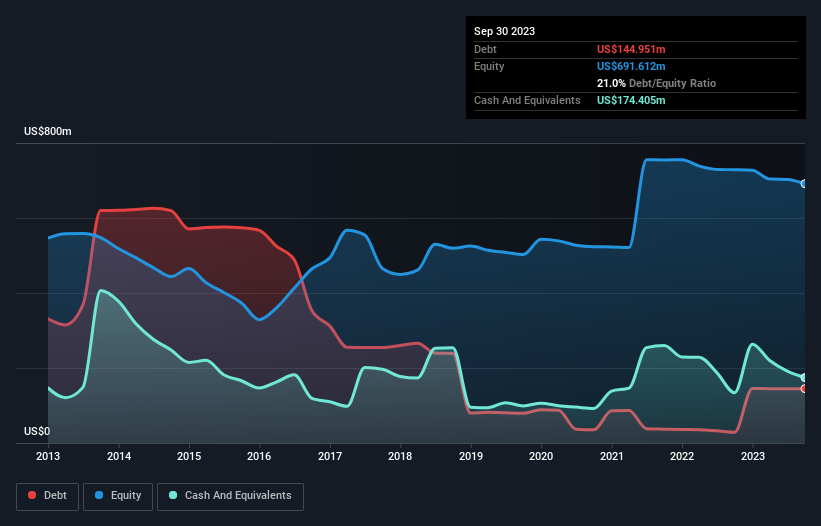
Warren Buffett famously said, 'Volatility is far from synonymous with risk.' So it seems the smart money knows that debt - which is usually involved in bankruptcies - is a very important factor, when you assess how risky a company is. We note that Clean Energy Fuels Corp. (NASDAQ:CLNE) does have debt on its balance sheet. But the real question is whether this debt is making the company risky.
Why Does Debt Bring Risk?
Debt assists a business until the business has trouble paying it off, either with new capital or with free cash flow. If things get really bad, the lenders can take control of the business. However, a more usual (but still expensive) situation is where a company must dilute shareholders at a cheap share price simply to get debt under control. Of course, debt can be an important tool in businesses, particularly capital heavy businesses. When we examine debt levels, we first consider both cash and debt levels, together.
View our latest analysis for Clean Energy Fuels
What Is Clean Energy Fuels's Net Debt?
The image below, which you can click on for greater detail, shows that at September 2023 Clean Energy Fuels had debt of US$145.0m, up from US$28.6m in one year. However, it does have US$174.4m in cash offsetting this, leading to net cash of US$29.5m.

How Strong Is Clean Energy Fuels' Balance Sheet?
According to the last reported balance sheet, Clean Energy Fuels had liabilities of US$145.8m due within 12 months, and liabilities of US$227.5m due beyond 12 months. On the other hand, it had cash of US$174.4m and US$134.4m worth of receivables due within a year. So it has liabilities totalling US$64.5m more than its cash and near-term receivables, combined.
Of course, Clean Energy Fuels has a market capitalization of US$751.6m, so these liabilities are probably manageable. But there are sufficient liabilities that we would certainly recommend shareholders continue to monitor the balance sheet, going forward. While it does have liabilities worth noting, Clean Energy Fuels also has more cash than debt, so we're pretty confident it can manage its debt safely. The balance sheet is clearly the area to focus on when you are analysing debt. But ultimately the future profitability of the business will decide if Clean Energy Fuels can strengthen its balance sheet over time. So if you're focused on the future you can check out this free report showing analyst profit forecasts.
In the last year Clean Energy Fuels wasn't profitable at an EBIT level, but managed to grow its revenue by 8.5%, to US$432m. That rate of growth is a bit slow for our taste, but it takes all types to make a world.
So How Risky Is Clean Energy Fuels?
Statistically speaking companies that lose money are riskier than those that make money. And we do note that Clean Energy Fuels had an earnings before interest and tax (EBIT) loss, over the last year. Indeed, in that time it burnt through US$69m of cash and made a loss of US$93m. Given it only has net cash of US$29.5m, the company may need to raise more capital if it doesn't reach break-even soon. Summing up, we're a little skeptical of this one, as it seems fairly risky in the absence of free cashflow. When I consider a company to be a bit risky, I think it is responsible to check out whether insiders have been reporting any share sales. Luckily, you can click here ito see our graphic depicting Clean Energy Fuels insider transactions.
At the end of the day, it's often better to focus on companies that are free from net debt. You can access our special list of such companies (all with a track record of profit growth). It's free.
New: AI Stock Screener & Alerts
Our new AI Stock Screener scans the market every day to uncover opportunities.
• Dividend Powerhouses (3%+ Yield)
• Undervalued Small Caps with Insider Buying
• High growth Tech and AI Companies
Or build your own from over 50 metrics.
Have feedback on this article? Concerned about the content? Get in touch with us directly. Alternatively, email editorial-team (at) simplywallst.com.
This article by Simply Wall St is general in nature. We provide commentary based on historical data and analyst forecasts only using an unbiased methodology and our articles are not intended to be financial advice. It does not constitute a recommendation to buy or sell any stock, and does not take account of your objectives, or your financial situation. We aim to bring you long-term focused analysis driven by fundamental data. Note that our analysis may not factor in the latest price-sensitive company announcements or qualitative material. Simply Wall St has no position in any stocks mentioned.
About NasdaqGS:CLNE
Clean Energy Fuels
Provides natural gas as alternative fuels for vehicle fleets and related fueling solutions in the United States and Canada.
Adequate balance sheet and slightly overvalued.
Similar Companies
Market Insights
Community Narratives




